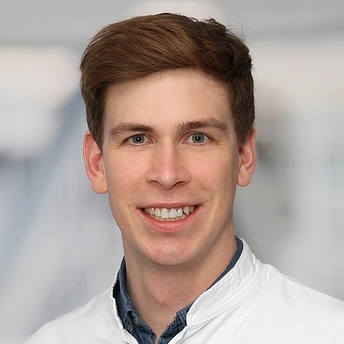-
The molecular interaction pattern of lenvatinib enables inhibition of wild-type or kinase mutated FGFR2-driven Cholangiocarcinoma. Stephan Spahn, Fabian Kleinhenz, Ekaterina Shevchenko, Aaron Stahl, Yvonne Rasen, Christine Geisler, Kristina Ruhm, Marion Klaumuenzer, Thales Kronenberger, Stefan A. Laufer, Holly Sundberg-Malek, Khac Cuong Bui, Marius Horger, Saskia Biskup, Klaus Schulze-Osthoff, Markus Templin, Nisar P. Malek, Antti Poso, Michael Bitzer. Nature Communication 15, 1287 (2024).
-
Compartmentalization of the host microbiome: how tumor microbiota shapes checkpoint immunotherapy outcome and offers therapeutic prospects. Boesch M, Horvath L, Baty F, Pircher A, Wolf D, Spahn S, Straussman R, Tilg H, Brutsche MH: J Immunother Cancer. 2022 Nov;10(11):e005401
-
Comprehensive clinical and virological characterization of three cases of fulminant liver failure owing to HSV1 primary infection. Spahn S, Riessen R, Berg CP, Malek NP, Emrich MH, Lohrengel K, Ganzenmueller T, Iftner T, Kleymann G, Hamprecht: K. Liver Int. 2022 May;42(5):1005-1011
-
Predicting the outcome of patients with hepatocellular carcinoma treated with immunotherapy – the CRAF-ITY score. Scheiner B, Pomej K, Kirstein MM, Hucke F, Finkelmeier F, Waidmann O, Schulze K, Koch S, Spahn S, Radu P, Siebenhüner AR, Mertens JC, Rahbari N, Kütting F, Waldschmidt DT, Ebert MP, Teufel A, Dosso Sd, Pinato DJ, Pressiani T, Meischl T, Balcar L, Müller C, Trauner M, Personeni N, Rimassa L, Bitzer M, Trojan J, Weinmann A, Wege H, Dufour JF, Peck-Radosavljevic M, Vogel A, Pinter M: J Hepatol. 2022 Feb;76(2):353-363
-
Targeting extracellular and juxtamembrane FGFR2 mutations in chemotherapy-refractory cholangiocarcinoma. Bitzer M, Spahn S, Babaei S, Horger M, Singer S, Schulze-Osthoff K, Missios P, Gatidis S, Nann D, Mattern S, Scheble V, Nikolaou K, Armeanu-Ebinger S, Schulze M, Schroeder C, Biskup S, Beha J, Claassen M, Ruhm K, Poso A, Malek NP: NPJ Precis Oncol. 2021 Sep 3;5(1):80.
-
NASH precludes anti-tumor surveillance in immunotherapy-treated hepatocellular carcinoma. Pfister D, Núñez NG, …, Spahn S, …, Llovet, JM, Heikenwalder M: Nature. 2021 Apr;592(7854):450-456.
-
Clinical and genetic tumor characteristics of responding and non-responding patients to PD-1 inhibition in hepatocellular carcinoma. Spahn S, Roessler D, Pompilia R, Gabernet G, Gladstone BP, Horger M, Biskup S, Feldhahn M, Nahnsen S, Hilke F, Scheiner F, Dufour JF, De Toni EN, Pinter M, Nisar NP, Bitzer M: Cancers (Basel). 2020 Dec 18;12(12):3830.
-
Generation and functional characterization of epithelial cells with stable expression of SLC26A9 Cl-channels. Salomon JJ, Spahn S, Wang X, Füllekrug J, Bertrand CA, Mall MA (*Co-lead authors): Am J Physiol Lung Cell Mol Physiol. 2016 Apr 1;310(7):L593-602.(* shared co-first author)

